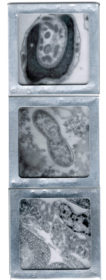
Rickettsia helvetica is in the family of spotted fever rickettsiae (SFR) bacteria, and related to Rickettsia rickettsii, which causes Rocky Mountain spotted fever. This bacteria is small, aerobic, gram-negative, intracellular organisms that are carried by ticks, lice, fleas and mites.
R. helvetica were not believed to be carried by ticks in the United States, until a STAT News story in 2016 revealed previously unknown findings from research leading to a 1982 paper published in Science and a 1983 paper published in the New England Journal of Medicine (NEJM). R. helvetica is found in France, Italy, Denmark, Hungary and Sweden where it is transmitted by the castor bean tick, or sheep tick, (Ixodes ricinus), as well as parts of Asia, including Japan, Laos and Thailand where it is transmitted by the taiga tick (Ixodes persulcatus).
R. helvetica infection is believed to cause damage to the central nervous system. Symptoms are similar to Rocky Mountain spotted fever and other rickettsial infections. However, it is difficult to diagnose as the symptoms are very general and can be confused with other illnesses, and include fever, headache and muscle pain.
Scientific studies have associated R. helvetica infection with unexpected cardiac death in young people, and there is at least one documented case of subacute meningitis caused by R. helvetica.
More research is needed into diagnostic testing for R. helvetica. Currently, in European countries where R. helvetica is prevalent, infections are diagnosed through immunohistochemistry or PCR based testing.
To our knowledge, none of the reference labs in the United States conduct specific tests for R. helvetica. However, it is highly likely that testing for Rickettsia in general will identify R. helvetica, and several labs conduct this testing including Lab Corp and Quest. In addition, tick-borne disease specialty labs such as Galaxy Diagnostics and Igenex, also offer PCR testing for rickettsial disease. Of note, it is well documented that the current “gold standard” diagnostic for Lyme disease, which consists of EIA (enzyme immunoassay, also known as an ELISA) and an immunoblot test, commonly, a “Western blot” test, misses up to 60% of cases of early stage Lyme disease..